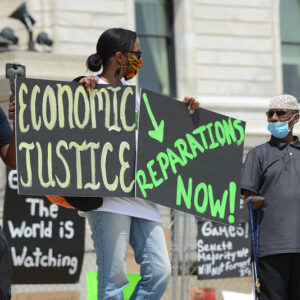At the close of the Civil War, America promised to redistribute 400,000 acres of Confederate land to Black families as redress for the horrors of slavery. But America failed to live up to its promise of “40 acres and a mule,” leaving a pathway for institutional racism to evolve and maintain generations of abuse, state-sanctioned violence, and white supremacy against Black people.
We know that reparations are critical to restore justice and to create a world where all people thrive. Reparations can also come in many different forms. While the U.S. government owes reparations for facilitating and legalizing stolen Black labor and discriminatory policies, so do corporations that profited from and fueled systemic racism, like Wells Fargo. Last year, we published a visual showcasing a timeline of Wells Fargo’s discriminatory practices against the Black community along with major achievements in the reparations movement. Here are a few stories of the leadership, mobilization, and innovative vision to make reparations a reality in Black communities across the U.S. within the past year.
Evanston, Illinois: Repairing the harm of racist housing policies
In 2019, Evanston became the first U.S. city to pass financial reparations for Black Americans. After Illinois legalized recreational marijuana, the city used funding from tax revenue along with private donations to fund a housing initiative, which provides reparations to Black residents who can demonstrate direct harm or are direct descendents of those who were harmed from discriminatory housing policies. This initiative initially consisted of a restorative housing program that assists eligible residents with a $25,000 grant towards mortgage assistance, down payments, and home renovations. Evanston recently expanded the reparations program beyond homeownership assistance to include a direct cash option in order to expedite payments to community “ancestors,” who experienced discriminatory housing policies.
The reparations effort hasn’t been without its challenges. Funding continues to be a hurdle as tax revenue from marijuana sales has been lower than expected, leading the city to include revenue from a real estate transfer tax to the program funds. Community leaders will continue to adjust throughout the process, instead of being paralyzed by the magnitude of developing this first-of-its-kind reparations plan. And the lessons Evanston learns through this process will help inform reparations models across the country.
California: Creating the first-ever state task force for reparations
While some federal lawmakers have long advocated for the establishment of a national reparations commission to develop reparations plans, California was the first state to actually do so. In 2020, California created its Reparations Task Force, and directed the group to investigate the effects of historical discrimination towards Black Californians in “voting, housing, education, disproportionate policing and incarceration,” and more. At the end of June, California’s reparations task force will send its final reparations recommendations to state lawmakers for consideration. The final report proposes restitution to Black Californians for “health harms, the devaluation of black businesses, housing segregation, mass incarceration, and over policing and unjust property takings.” Some economists estimate that if the Governor and state legislature approved the plan, it could cost about $800 billion in payouts. At a national scale, these estimates begin to put into perspective the economic cost of historical discrimination and stolen Black labor, which helped build America’s economy, infrastructure, and early industries.
Baltimore, Maryland: Increasing investment in education, healthcare, and economic opportunities
Baltimore is the latest city to approve its own reparations commission, using funding from Maryland’s Community Reinvestment and Repair fund. The city council approved Baltimore’s Community Reinvestment and Reparations Commission to explore and recommend strategies for reparations, acknowledging the need for redress and reconciliation. Once Mayor Brandon Scott signs the ordinance, the commission will work to identify various avenues to address historical inequities faced by Black residents and provide additional funding for local low-income assistance programs.
The leadership from local Black activists across the country shows that reparations are possible and necessary to provide restorative justice for Black communities. And local and regional efforts are creating reparations models that will build momentum for national reparations for Black Americans. In recent years, the National African American Reparations Commission called on President Biden to sign an executive order on H.R. 40, the congressional bill to establish a national reparations commission.







